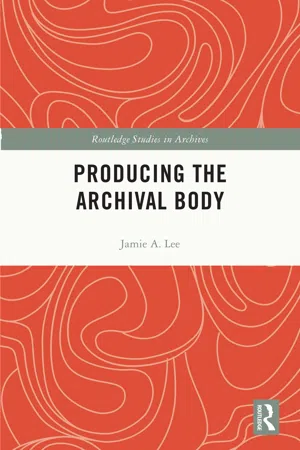
- 170 pages
- English
- ePUB (mobile friendly)
- Available on iOS & Android
Producing the Archival Body
About this book
Producing the Archival Body draws on theoretical and practical research conducted within US and Canadian archives, along with critical and cultural theory, to examine the everyday lived experiences of archivists and records creators that are often overlooked during archival and media production.
Expanding on the author's previous work, which engaged archival and queer theories to develop the Queer/ed Archival Methodology that intervenes in traditional archival practices, the book invites readers interested in humanistic inquiry to re-consider how archives are defined, understood, deployed, and accessed to produce subjects. Arguing that archives and bodies are mutually constitutive and developing a keen focus on the body and embodiment alongside archival theory, the author introduces new understandings of archival bodies. Contributing to recent disciplinary moves that offer a more transdisciplinary emphasis, Lee interrogates how power circulates and is deployed in archival contexts in order to build critical understandings of how deeply archives influence and shape the production of knowledges and human subjectivities.
Producing the Archival Body will be essential reading for academics and students engaged in the study of archival studies, library and information science, gender and women's studies, anthropology, history, digital humanities, and media studies. It should also be of great interest to practitioners working in and with archives
Frequently asked questions
- Essential is ideal for learners and professionals who enjoy exploring a wide range of subjects. Access the Essential Library with 800,000+ trusted titles and best-sellers across business, personal growth, and the humanities. Includes unlimited reading time and Standard Read Aloud voice.
- Complete: Perfect for advanced learners and researchers needing full, unrestricted access. Unlock 1.4M+ books across hundreds of subjects, including academic and specialized titles. The Complete Plan also includes advanced features like Premium Read Aloud and Research Assistant.
Please note we cannot support devices running on iOS 13 and Android 7 or earlier. Learn more about using the app.
Information
Part I
Body parts
Chapter 1
Archival underpinnings
Prologue: Archives story
The problems of the United States are not peripheral and have not been met by our genius at reform. They are not the problem of excess, but of normalcy. Our racial problem is not the Ku Klux Klan or the South, but our fundamental liberal assumption that paternalism solves all. Our economic problem is not a depression but the normal functioning of the economy, dominated by corporate power and profit. Our problem with justice is not a corrupt judge or bribed jury but the ordinary day-to-day functioning of the police, the law, the courts, where property rights come before human rights… If all this is so, then the normal functioning of the scholar, the intellectual, the researcher, helps maintain those corrupt norms in the United States, just as the intellectual in Germany, Soviet Russia, or South Africa, by simply doing his small job, maintains what is normal in those societies.4
Table of contents
- Cover
- Half Title
- Series Page
- Title Page
- Copyright Page
- Dedication
- Table of Contents
- List of Figures
- Routledge Studies in Archives
- Acknowledgments for the gifts of knowledge
- Introduction: Producing the archival body
- Part I Body parts
- Part II Bodies in action
- Index